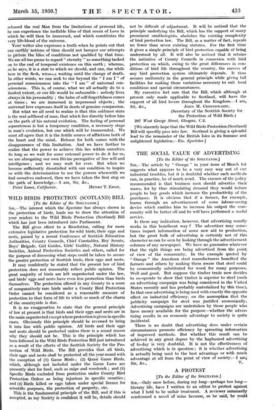THE SOCIAL VALUE OF ADVERTISING
[To the Editor of the SrEeTATon.] SIR,—The article by " Omega " in your issue of March 1st suggests what appears to be a very easy way out of cur industrial troubles, but it is doubtful whether such methcds can, in practice, be of much avail. The essence of the policy recommended is that business men should advertise their wares, for by thus stimulating demand they would induce people to buy goods which increase the productivity of the purchaser. It is obvious that if a fanner, for example, learns through an advertisement of some labour-saving device which enables him to increase his output the com- munity will be better off and he will have performed a useful service.
Is there any indication, however, that advertising usually works in this beneficent way ? The advertiser may some- times impart information of some new aid to production, but the great bulk of advertising is certainly not of this character as can be seen by looking through the advertisement columns of any newspaper. We have no guarantee whatever that the right things are being advertised from the point of view of the community. In the example quoted by " Omega " the American steel manufacturers benefited the farmers and others by making them aware that steel could be economically substituted for wood for many - purposes. Well and good. But suppose the timber trade now decides to co-operate to show that timber is superior 'to steel (such an advertising campaign was being considered in the United States recently and has probably materialized by this time). In that case advertising is being used with exactly the opposite effect on industrial efficiency, on the assumption that the publicity campaign for steel was justified economically. Advertising campaigns are undertaken by those people who have money available for the purpose—whether the adver• tising results in an economic advantage to society is quite incidental.
There is no doubt that advertising does under certain circumstances promote efficiency by spreading information of imprOved methods. But whether this result can be achieved in any great degree by the haphazard advertising of to-day" is very doubtful. It is not the effectiveness of advertising which is in question ; it is whether advertising is actually being used to the best advantage or with much advantage at all from the point of view of society.—I amj




















































 Previous page
Previous page